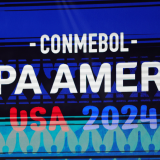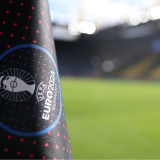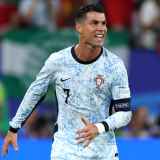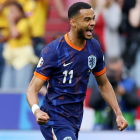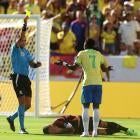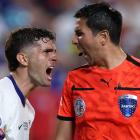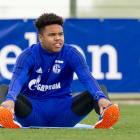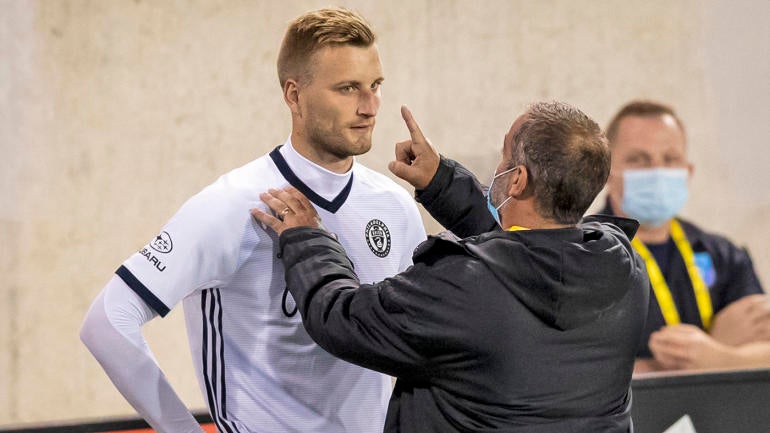
Major League Soccer Monday announced the introduction of concussion substitution trials for the 2021 season with two additional changes for suspected head injury victims allowed outside of the regular five that will continue into the new campaign after being introduced last year. U.S. Soccer and all professional leagues in the United States will implement the same rule.
The International Football Association Board (IFAB) approved trials for concussion substitutions back in December of 2020 and the system was consequently introduced in the Premier League and Women's Super League (WSL) until the end of the 2020-21 campaign back in February.
With these trials in place, MLS will ensure the safety of players without putting teams at a competitive disadvantage by allowing permanent withdrawals from the field instead of temporarily playing on with 10 men while a decision is made.
MLS senior VP of competition and medical Jeff Agoos, a two-time World Cup participant, five-time MLS Cup champion and a National Soccer Hall of Fame inductee spoke exclusively with CBS Sports about the new concussion substitution trials.
"We have dedicated and trained medical staff to identify and evaluate head injuries." he said of the method for determining a concussion. "Each team is required to have a minimum of two athletic trainers or physios and each home team will require a physician on the bench. There will also be a dedicated Venue Medical Director with responsibility for the health and safety of all players on the field.
"When there is a head injury, an evaluation will occur by that team's medical staff and the VMD might also be asked to give an evaluation. It will then be determined if it is a concussion, a suspected concussion, or something different."
In addition, MLS employs a spotter program to provide additional video images to the VMD at the fourth official's table to aid a more informed decision process. This spotter program is run remotely often from a centralized hub.
"We will also have additional tools available to the venue medical director that will include a spotter program that will be run remotely and through a centralized hub," Agoos added. "That spotter will provide video images to our venue medical director at the fourth official's table.
"To clarify, the spotter will not make any medical decisions. The spotter will only provide images and video from different angles that the venue medical director or club physicians might not have been provided with. Based on those images and on-field assessment, the concussion or suspected concussion can be evaluated."
There are similarities with video assisted refereeing too, with the introduction of the medical sideline review that will empower the fourth official and the medical teams present on both sides.
"It will be called an MSR for medical sideline review," said Agoos exclusively. "We have been very successful in implementing video review in the VAR system. Essentially, we have moved the platform down to the fourth official's table.
"The fourth official will now have the ability to have all of the angles on a broadcast similar to VAR, but they are separate and independent systems. We think that they are complimentary, and we are actually using the same systems."
Agoos admitted that he was fortunate to only suffer from one concussion during his playing days, but that one college incident could have ended badly decades before the current strides being taken in soccer across the globe.
"I was actually pretty fortunate," explained Agoos. "I recall one significant head injury that happened when I was in college and I took a knee to the side of my eye. I was not knocked out, but I was very impacted, and I was seeing double for days afterwards. Many, many years ago, the evaluation was different and fortunately, I was taken off immediately.
"We want to be as careful as we possibly can and to make sure that we have protocols aligned with our players associations and concussion committee. Player safety and health is our priority."
Craving even more coverage of the world's game? Listen below and follow ¡Qué Golazo! A Daily CBS Soccer Podcast where we take you beyond the pitch and around the globe for commentary, previews, recaps and more.
Concussion substitutions are something that Agoos expects to develop further as the science around soccer improves but he's happy that the ball is now rolling.
"Those decisions will ultimately be made by trained physicians and medical staff," he said. "The science is still evolving, and we want to make sure that we have the tools available to our medical staff and physicians that provide them with the best opportunity to make an informed decision.
"We think we are moving in the right direction and that the implementation of concussion substitutions is part of that discussion. However, we continue to evolve the science and move with it."
Consequently, Agoos believes that MLS is a safer environment for players and hopes that it makes the league even more attractive as a long-term result.
"That is our hope," added the Swiss-born American. "Our number one priority is to make sure that we create an environment that is safe for players, for head injuries and other types of injuries or illness."
Agoos also applauded FIFA's current steps towards addressing the issue and suggested that concussion substitutes could be a fixture in the game by the time the 2026 World Cup, partly on American soil, arrives.
"I cannot speak for FIFA as to the direction that they will go in, but I applaud their efforts to move in this direction with these trials," he said. "I think that the trials will work out where we can continue to create advantages for our players.
"We will also identify some areas where we face challenges or there are opportunities to improve. That has really been part of the trial with VAR. I think that they are taking a good and important approach to trying to manage, identify and evaluate significant head injuries like concussion and suspected concussion."


